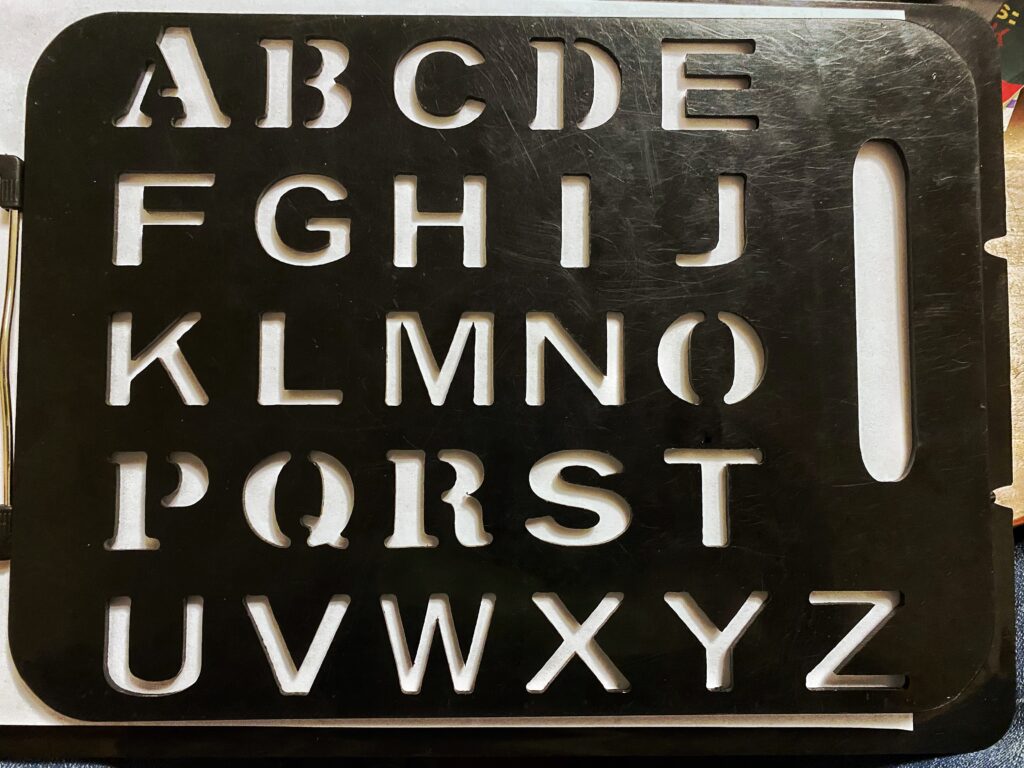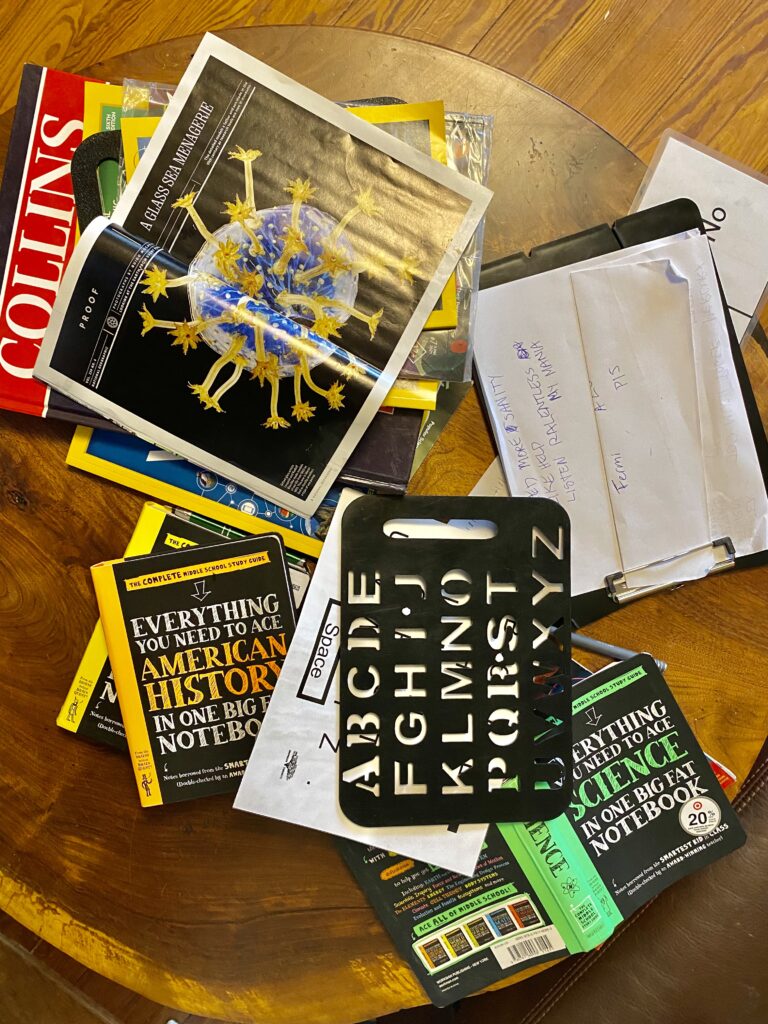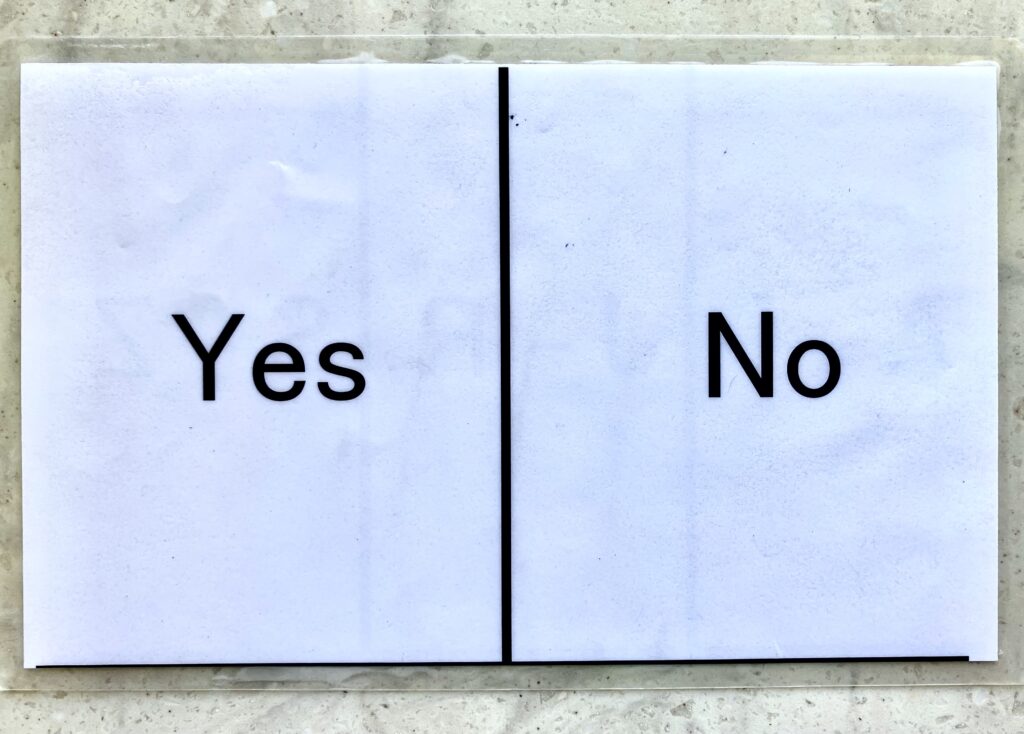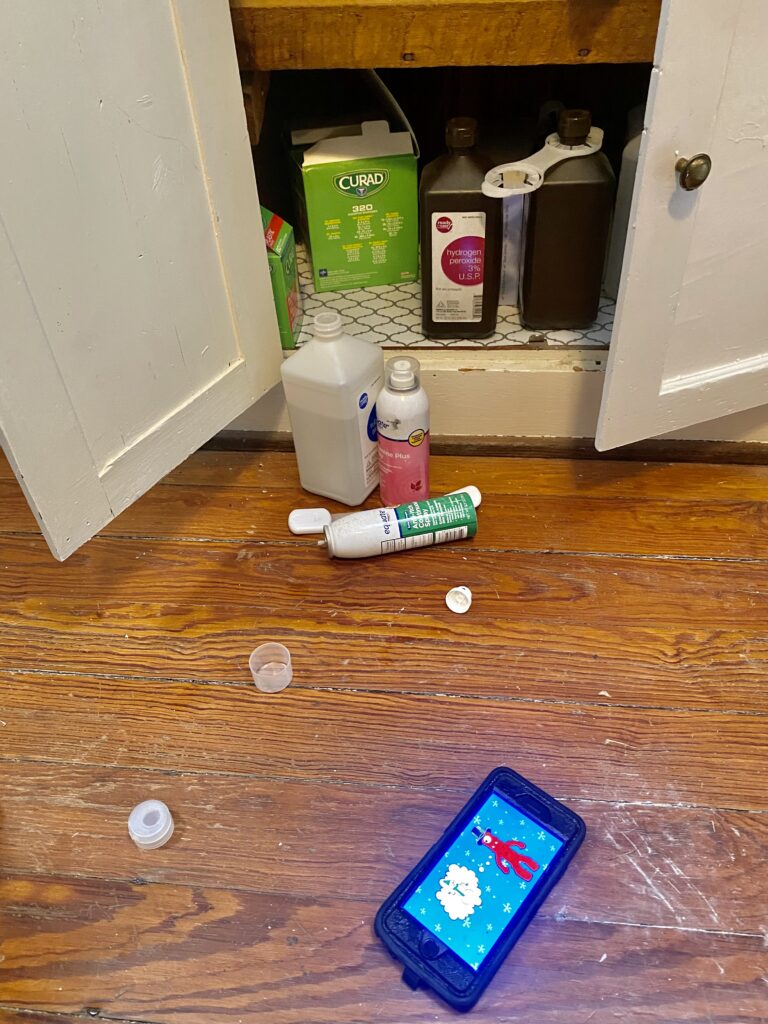TL;DR. My autistic son can now communicate with us while using a stenciled “letter board”. But we’re not at a Lifetime movie happy ending quite yet.
Some people learned how to bake bread or grow their own food during the pandemic. Having given up city life to launch a farm in 2014, I had already experienced the can-do, mind-blown, I’m-practically-a-pioneer-woman accomplishments that every new farmer tries out before they realize that it’s not a terrible idea to maintain your Costco membership. As a somewhat isolated autism parent, I had also discovered the joy of puzzles long before I was officially locked into my house by a pandemic. And I certainly didn’t feel like writing, as you can tell by the two years that has passed since I last decided to publicize my family’s challenges to the world through this blog.
So I basically gritted my teeth and prayed that my son’s attendants and ABA company didn’t abandon us. I’m sure no special needs parents will be surprised to hear that our pre-pandemic lives weren’t fundamentally different than our mid-pandemic lives; our social lives and social engagements weren’t exactly stellar to begin with. (I confess that part of me chuckled a bit at the idea that “normal” families were getting a taste of our own lonely and tedious lives during their time stuck inside in 2020. But I digress…)
HOWEVER, after realizing that my son had made absolutely zero progress using icon-based tablet apps to communicate for the past six years…a wonderful woman came out of nowhere, knocking on our door, so to speak, asking if she could work with my son on Saturday mornings, using a letter board. She was getting certified in teaching this communication method, and needed to expand her reach to younger people. After speaking with her about our own experimentation with Rapid Prompting Method (RPM) when our son was younger, she sent me some book recommendations to learn more about people with non-verbal autism, who actually had plenty to say. In particular, it was the stories she offered up about finally being able to ask her son why he went into flight mode at the grocery store that made an impact and convinced me to open my mind. I think every parent of a non-verbal autistic person out there would be desperate to understand what makes their child tick.
For years I have yearned (not a word I use lightly) to understand why my son does some of the crazy stuff he does. I have actually had dreams where I could hear him speak, or where other people who took care of him were able to get him to speak…because of course my subconscious would serve up that predictable self-doubt dessert: if he had had a different mother, she would be able to get him to speak!
So with her recommendation, I picked up a book: Ido in Autismland. It was not an easy read. (And this blog post is not a book report either.) The main takeaway daggers to my own heart, after dipping in and out of his book, included the following: his years-long struggles to communicate “correctly enough” to make his ABA overlords happy…having his heart broken after his father didn’t believe that he was trying to communicate through his mom, because he needed to rest his arm on his mom’s arm…being frustratingly trapped behind his autism and forced to endure color and shape matching in school for all those years, despite having an above average intellect…Suffice it to say, I read it up to a certain point, and then decided to give RPM a shot. Our one-time au pair (and Max’s favorite caregiver ever, if I’m being honest) had tried RPM with Max years ago but had stopped, since we weren’t entirely sure how much prompting she had been doing to get Max to answer her questions. Also, money and distance to the RPM teacher had been a concern.
For years, stupid people had asked me if my son was really good at math. Seriously. This myth still exists. He has autism, so he must be extremely and narrowly talented at one thing, right? People simply couldn’t fathom that someone just.has.autism. with no superpowers included. Indeed, I had always wondered if my son was “intellectually disabled”, as the experts had suggested. My instinct said no, he was not. He seemed to possess normal intelligence up until the point at which he lost his speech, between the age of 3 and 4. Since then, he had not experienced any seizures, head injuries, or serious illnesses. So how could his IQ simply drop? I’m sure a doctor could provide myriad reasons why such a thing could happen; however, I just had a feeling that he was in there, in tact.
On the other hand, when it came to learning a new method and being solely responsible for implementing it at home, on top of all my other responsibilities….I had my doubts. Another stumbling block was my very real lack of teaching ability. I know what I know. But I have no idea how to transfer that knowledge into someone else’s brain. Also? I lack patience. There are simply too many things that I need to accomplish each day to keep my own personal planet spinning. But above all, I doubted my ability to be a clearheaded teacher for a boy that I was very much emotionally entangled with.
Also, our BCBA at the time had made no secret of her disgust for RPM. The need for “evidence-based practices” is a major roadblock (as I understand it, from the little toe dipping I’ve done on the Internet) for a lot of parents trying to do right by their kids by following the rules and “the data”, and obey the advice given by people who supposedly know more than we do about autism. However, ABA with all of its data didn’t actually get my son to the point where he could tell us what he wanted/needed/thought. Yay for him being able to wash his hands. But what about who he is? ABA was never going to help me unlock my son. And OMG: if I had to listen to another attempt to determine what the “antecedent” was for the bad behavior my son was exhibiting! While keeping a neutral face on the outside during such discussions, on the inside I was certain that he was doing some of this shit simply because it felt good to him…because he wanted to…because he needed to. No antecedent investigations needed to solve that mystery.
Above all, rather than gather data and speculate, I wanted him to tell me.
Despite my mountain of reasons for not trying it, I let Shannon Zish convince me to come into Unspoken Thoughts. I had no idea what to expect, especially after my son crawled all over her office during our first couple of sessions. Nonetheless, I went home and implemented some of her methods for allowing him to make easy choices following a “lesson” of some sort. We started working together following the attempted overthrow of the U.S. Government on January 6th, so that was very much on my mind. I also didn’t have to be an expert in order to have plenty to say to him about it. I quickly deduced that our son knew exactly who the President was in 2020 and who the President was in 2021. And with that, we were off and running.
I won’t attempt to explain how RPM was developed by a mother named Soma Mukhopādhyāy in Texas. I won’t because I can’t. I don’t know much about it. I will tell you that the ideal progression is to move my son from poking the letters on a stenciled letter board to touching them with his fingers to touching a flat, laminated letter board, to a tablet-based electronic alphabet, and finally (and this part still seems pretty far off right now) to a traditional keyboard. And the general idea is to teach non-verbal autistic people how to control their bodies and their eyes in order to get the words, choices, and ideas out that they are unable to communicate in any other way. There are books, videos, and classes (and probably a lot of debate) for you to peruse on the Internet, if you wish. However, I didn’t bother with any of it. I just jumped in and tried. I had no interest in the research, the debates, or the handwringing.
After 10 years of autism and all the various therapies (but not the really batshit crazy ones, for the record) and very little progress, RPM didn’t seem any more far-fetched than graphing the number of times my son got up and ran away during a meal after being redirected, and hoping that the graph was going to result in a strategy that would make my son sit still for five minutes during dinner. Either RPM was going to work for my son, or it wasn’t. 10 years into this “journey” (gag) and I am always ready for some therapy to fail or have results so faint that I couldn’t be sure if it was just through sheer wishing that I was indeed seeing actual results.
How It Works for Us: I sit with my son on a couch. I sit on his right side and hold up a letter board. He holds a pen or stylus and pokes through the letters. In the beginning, I had to shut the bathroom door to reduce his urge to run in there and futz with our washing machine. I had to endure random moments of escape so that he could bang on the piano that is also in the room. I figured out how to block his escape with a table on one side of him and me on the other. But together, on that couch, he gradually stopped trying to escape (mostly) and began spelling out single word answers to my questions.

I picked up a couple of books that covered everything you were supposed to learn in middle school. I started with the books on U.S. and World History, and added English and Science books next. But I skimmed through the science books, figuring that it would be waaaaay too hard for a history major like myself to get through that stuff with my son, and put them to the side. The history books were easy enough though: I was actually comfortable adding color commentary along the way, and even looking up images and videos on my phone to make the lessons more visual for my visually-oriented son.

We went back to Unspoken Thoughts once a week and walked out of there with additional assignments from Shannon to try to incorporate into our lessons. As I grew more comfortable, I even started working our way through the science book, starting with the geology that I actually knew something about, and stumbling my way through physics concepts such as magnetism, gravity, and waves. And this kid could understood all of it: the big words, the concepts, and, in the case of our history lessons, the countries, people, and basic economics. In fact, it became obvious that whatever he was taught and whatever was discussed in a video or conversation around him, he understood all of the details and could answer the questions I posed to him with stunning accuracy afterwards.
But it doesn’t exactly come spilling out of him like word water.
Even now, he sometimes can’t stop himself from poking through the same letters over and over again, between the correct letters (he currently really favors the letter “T”), or he pokes every letter around the contextually obvious letter that he’s actually trying to poke. His motor control and vision (I’m sure there’s an actual word for the combination of these two things) varies from day to day. While waving an educational video playing on my phone in front of his face, his eyes hop all over the room, while he twists his hands. His eyes may never even land on the video playing in front of him.
What doesn’t vary is the obvious fact that my son is literate. And intelligent. He hears every last detail in the videos and then spells out the Latin and scientific terms he has just learned about. When I quiz him on a big word like “derogatory” or “secular”, he spelled out “INSULTING” and “NO RELIGION”. When I give him a logical fill in the blank kind of question about what might cause the Earth to possess a magnetism so strong that it can deflect magnetic waves coming from space, he spelled out “magnetic metal core” in response (or some such, because he answers so many questions regarding our lessons these days that I can’t honestly remember what he said even a few weeks ago).
After about five months, my son started to spell out complete sentences. Important ones worth mentioning here include:
“I AM NOT RETARDED.” (He likes to spell that one out a lot, sadly. He originally said this after I had told my husband that I had asked my son to “hold it together” as we approached two tween girls on the street, who wanted to meet our dog, and he made terribly loud noises as soon as we were near them. Later, I asked him if he could control these noises, to which he said “YES”. But when asked if he wanted to control these noises, he said “NO”.)
“NOT STUPID. SMART.”
“I NEED MORE SANITY. I AM TERRIBLY NERVOUS. MY MANIA IS RELENTLESS.” (In response to my question about why he keeps digging through the garbage and searching for food immediately after having been fed.)
“IT CALMS ME.” (In response to a question about why he twists his hands constantly–a stim of his.)
However…
Before anyone gets too excited about me suddenly discovering the key to my son’s inner voice, I should point out that getting even this much information out of him is an extremely stressful experience for the both of us. I have to convince him to stop twisting or breathing in a borderline hyperventilating way. He has to be able to control his hands and spell out an answer. And I have to keep it together during what can be an agonizingly long time.
Also, I don’t get satisfying answers to my burning questions much of the time. Lately, he has simply spelled out “BECAUSE I AM AUTISTIC” to many of my questions, in addition to “I DON’T KNOW”. When I asked him how he felt about being able to communicate with us after all this time, he simply said “BETTER”, despite my fantasy of him unloading a decade’s worth of resentment, needs, desires, secrets…anything really.
Sometimes, asking him a question feels a bit like asking a Ouija board something you’re not sure you want to hear the answer to. Honestly, I’m worried that one of these days, he’s going to comment on my terrible parenting skills, or….
Ask me why we didn’t do this sooner with him.
To which I have no good answer. It turns out, my son has been able to read since he was eight. Apparently he taught himself to read with the magazines we had sitting–classily–near a toilet in our last house (and now you are really judging me). This means that, theoretically, my son has been able to communicate with us for at least five years.
For five years, we could have been asking him what he wanted for a snack, or why he was crying, or what kind of music he liked, or taught him something besides color and shape matching. But we didn’t. Because we weren’t curious enough to try. Or maybe, we were simply tired of being disappointed by the ever growing list of therapies that were going to make my son’s life better…and thereby make our lives better as a consequence. No elimination diets, supplements, speech therapy, iPad apps or behavior therapy had yielded much that was in any way emotionally satisfying for any of us.
Indeed, a recent BCBA wasn’t even sure how to get my son to make yes/no choices, because she felt it was such a difficult concept to teach. She never did come up with a recipe for instruction. But it turned out, all my son needed was a laminated paper with “YES / NO” printed in big, separate words. He just needed something to point at. No analysis needed in order to develop a detailed program in order to teach a 13 year old the meaning of two words that all of us hear from a young age. Turns out, my son was intelligent enough to know the difference between yes and no…as well as the difference between electrons and protons.

And all this time, we had no fucking clue.
So yeah, I’m waiting for him to spell out a full paragraph of all his complaints about my parenting skills. I absolutely deserve it. But so far, after Shannon asked me to start having him ask his own questions in order to create an actual conversation, the only thing this kid asked me was “DO YOU LOVE ME?”
Don’t get too teary eyed, though.
Despite this amazing letter board key that will unlock the son that his been trapped in there for the past 10 years, he is still very much an autistic boy who behaves in very frustrating ways. Indeed, knowing that he’s intelligent at the same time as we witness him pouring out soap and lotion bottles onto countertops, licking hand sanitizer pumps, digging through the garbage, or eating his sister’s paint, is a very hard pill to swallow. Of course, I have asked him why he does this, to which he replies “BECAUSE I AM AUTISTIC.”
In fact, after he ripped off one of my piano keys the other morning, I asked him whether he was aware of how upset he made us, and if he knew that the things he did on a regular basis were unsafe, poisonous, and destructive. Of course, he said “YES”. But when asked why he still did them, he gave me the autism excuse. And just tonight, we had a little “emergency session” to discuss why he felt the need to open up a bottle of rubbing alcohol and tear off the tops of two first aid spray bottles that I had tried and failed to lock up in our old and rickety cabinets. He told me that he needed to “taste them” but that he hadn’t “eaten them”. Oh good! And when asked if he would be able to stop himself from tasting the tops of other dangerous products in the future, he told me that he would not be able to stop himself.

Can you imagine how frustrating it is to learn that your child is very intelligent, after being unable to communicate for 10 years, and still be forced to endure the mystery and miseries of severe non-verbal autism? Nothing in our home life has changed. Everything is still locked. We still need to defend ourselves from his reach when opening the pantry (I like to sweep my legs behind me, ice skater-style to keep him from getting close enough to grab whatever is within reach), where we now also need to store our salt and pepper shakers and our tape dispensers. We still need to lock up all of the soap, and check on him while cooking dinner, to make sure that he hasn’t escaped from an unlocked door, or gotten into his sister’s craft supplies. I only recently took all the duct tape off the top of our wooden dining room chairs after he would gnaw on them, but I know that I’ll need to put it all back on again soon enough, when that habit cycles back around.
So yes. My son is intelligent. He understands everything that goes on around him. He should be taught the same things as your kids learn in your general education classes. He has a large vocabulary and favors the word “calamitous”. But he is still severely autistic. And he still can’t explain in any satisfying way to me why he continues doing those things that make the people who love him so frustrated, and that force all of us to live inside a prison of a house. The letter board is not a cure-all that makes this struggle more bearable. In many ways, it confirms what I already knew: sometimes he just does stuff because he has to/needs to/must do, even if it harms him. The upshot is that I can ask at least him about this stuff directly, rather than collect data for months and just guess at his “antecedent” triggers.
We’re only six months in. I hope to get some real answers from him about who he is, in addition to getting through all of the middle school academics that he won’t get in school. Maybe he’ll write his own tell-all book one day. He says he wants to go to college, but he will have to learn how to sit for much longer…not to mention how to not eat or destroy parts of his classroom.
I also hope he has the nerve to tell me what he really thinks of me. It’s probably going to hurt. But maybe he’ll forgive me for not trying harder to reach him for the past 10 years. And maybe one day I’ll get him to explain why he can’t control his behaviors, even though he apparently understands that they are harmful. Then we will finally have a real conversation.
P.S. I am so grateful to Shannon with Unspoken Thoughts for convincing me to give RPM another shot, and to Pam (you know who you are). Sometimes Facebook does result in good things.
